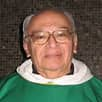Christmas is the feast of the Incarnation—Jesus Christ, simultaneously fully divine and fully human, dwelling among us. He comes to the world not in splendor, but in a stable in an out-of-the-way town “where ox and ass are feeding.” That stable, displayed in millions of homes this month, symbolizes our modern world, broken yet redeemed.
For over 400 years Roman Catholicism ducked its appointment with modernity, reacting many times with aloof superiority or even with hostility. Since 1517 Catholicism has been uneasy with the loss of community as the individualism associated with the Protestant Reformation ascends. Catholicism was additionally turned off by the violent anti-clericalism of the French Revolution and later revolutions. Further, Catholicism takes a defensive posture with those expressions of Protestant Christianity in this country and elsewhere that are explicitly anti-Catholic. Catholicism’s caution about the modern world is also related to its opposition of communism’s total denial of the spiritual. Finally, Catholicism was and remains cautious toward some “scientific” trends, including a materialistic notion of evolution and eugenics with its accompanying embrace of abortion.
Catholicism’s defensive strategy officially changed at Vatican II (1962-1965). The new method is dialogue with modern ideas. The dialogue means learning about God’s revelation from the world of science, reason, exploration, forms of governance, modern art, and global commerce, from non-Catholic expressions of Christianity and from non-Christian expressions of faith. This dialogue with the world, please realize, does not exclude disagreements.
The new strategy requires a fresh definition of church. The word still applies to buildings, but that is not its deepest meaning. Nor is the church primarily bishops, their clergy, and their helpers. The word church means all the baptized.
How are people today able to gather around the Christmas stable—a symbol for our world?
In recent days Pope Francis concluded a multi-year synod that was meant to model how Catholic leaders can internally discuss vital topics. It was a synod about a process. Understandably, the press did not find a three-year meeting about a new process interesting. Instead, newspaper and magazine ink was mostly given to a few controversial topics like ordained women deacons in Catholicism and changes in celibacy requirements for clergy, better treatment of gays, lesbians, and those others whom Catholicism has maligned.
Nonetheless, the synod was an expression of Vatican II and particularly of Pope Francis’ primary theme: In our modern place and time the church (people of God) finds the incarnate Christ along the peripheries. To hear the word of God, people must attentively listen to those huddled around a stable in Bethlehem, those scrambling among ruins within Syria, those in line at the Wednesday morning food pantry, and those young adults who are unsatisfied with our vacuous culture.
How can Catholics and others from the east and west find the stable and there have fruitful engagements with what is happening in our modern world? This month happens to be the 60 th anniversary of Vatican II’s Dogmatic Constitution on the Church. Therein is a paragraph about the new definition of church, about how that church influences the world, about how the world enriches the church and about the true meaning of Christmas:
The entire people of God by their very vocation seek the kingdom of God by engaging in temporal affairs and by ordering them to the plan of God. They live in the world, that is in each and in all of the secular professions and occupations. They live in the ordinary circumstances of family and social life from which the very web of their existence is woven. They are called there by God so that by exercising their proper function and being led by the Spirit of the gospel they may work for the sanctification of the world from within, in the manner of leaven.
Droel edits a free newsletter on faith and work, INITIATIVES (PO Box 291102, Chicago, IL 60629)










